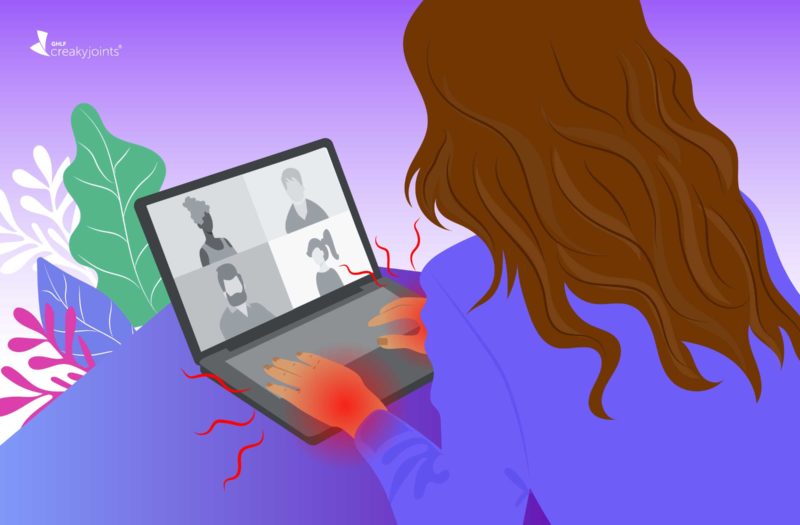Learn more about our FREE COVID-19 Patient Support Program for chronic illness patients and their loved ones.
Studies to date have not shown that you’re at higher risk for contracting COVID-19 if you have a rheumatic condition such as rheumatoid arthritis or lupus, but that could also be a result of heightened precautions that such patients are taking to protect themselves from exposure.
In order to understand this better, Dutch researchers collected information on demographic data, medication use, rheumatic disease activity, COVID-19-related symptoms, and implementation of self-isolation measures through an online survey in an ongoing study of 979 Dutch patients with rheumatic disease and 414 healthy controls.
The first results of the study, published in the journal The Lancet Rheumatology, show that between April 26 and May 27, when the Dutch government was encouraging the general population to stay indoors as much as possible, rheumatic disease patients adhered to these guidelines better than the general public.
The researchers found that 46 percent of patients with rheumatoid arthritis, ankylosing spondylitis, or psoriatic arthritis adhered to strict isolation measures, compared to just 29 percent of healthy controls. Even after adjusting for factors like age, sex, and body-mass index, rheumatic disease patients were nearly twice as likely to adhere to self-isolation recommendations than healthy controls.
Overall, women took stricter isolation measures than men. In rheumatic disease patients, those who were receiving biologic DMARDs (disease-modifying antirheumatic drugs) took stricter isolation measures than those who were not taking them.
One limitation of the study is that control participants were neither a random population sample (researchers asked rheumatic disease participants to sign up healthy individuals in their close network) nor a perfect match for patients with rheumatic disease. However, the researchers attempted to account for this by adjusting for a variety of factors.
Although neither rheumatic disease nor use of immunosuppressive medication (aside from steroids) has been linked to higher infection rates or worse COVID-19 outcomes, this may be because studies that observe these associations do not account for patients’ own preventive measures to limit exposure to the virus.
“If patients subject themselves to stricter isolation measures than the general population, we might be falsely reassured,” note the researchers.
Currently, the U.S. Centers for Disease Control & Prevention (CDC) states that people of any age are at increased risk of severe illness from COVID-19 if they have the following conditions:
- Cancer
- Chronic kidney disease
- COPD (chronic obstructive pulmonary disease)
- Immunocompromised state from solid organ transplant
- Obesity
- Serious heart conditions
- Sickle cell disease
- Type 2 diabetes
The CDC notes that people with several other conditions such as asthma, hypertension, liver disease, or type 1 diabetes might be at an increased risk. Also included in this group is people with who are immunocompromised from “use of corticosteroids or use of other immune weakening medicines.”
Much is still being learned about COVID-19, but in general, the guidelines for staying safe are simple (albeit sometimes difficult to adhere to):
- Maintain a social distance of six feet or more from people outside of your household whenever possible.
- Wear face coverings when out in public and when you can’t be socially distant.
- Wash or sanitize your hands frequently and disinfect commonly touched surfaces.
- Avoid large groups or situations when it will be hard to be socially distant.
- When spending time with others, being outdoors is safer than indoors.
Get Free Coronavirus Support for Chronic Illness Patients
Join the Global Healthy Living Foundation’s free COVID-19 Support Program for chronic illness patients and their families. We will be providing updated information, community support, and other resources tailored specifically to your health and safety. Join now.
Hooijberg F, et al. Patients with rheumatic diseases adhere to COVID-19 isolation measures more strictly than the general population. The Lancet Rheumatology. August 27, 2020. doi: https://doi.org/10.1016/S2665-9913(20)30286-1.
People with Certain Medical Conditions. Coronavirus Disease 2019 (COVID-19). U.S. Centers for Disease Control and Prevention. August 14, 2020. https://www.cdc.gov/coronavirus/2019-ncov/need-extra-precautions/people-with-medical-conditions.html.






